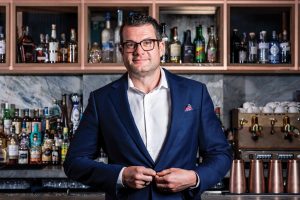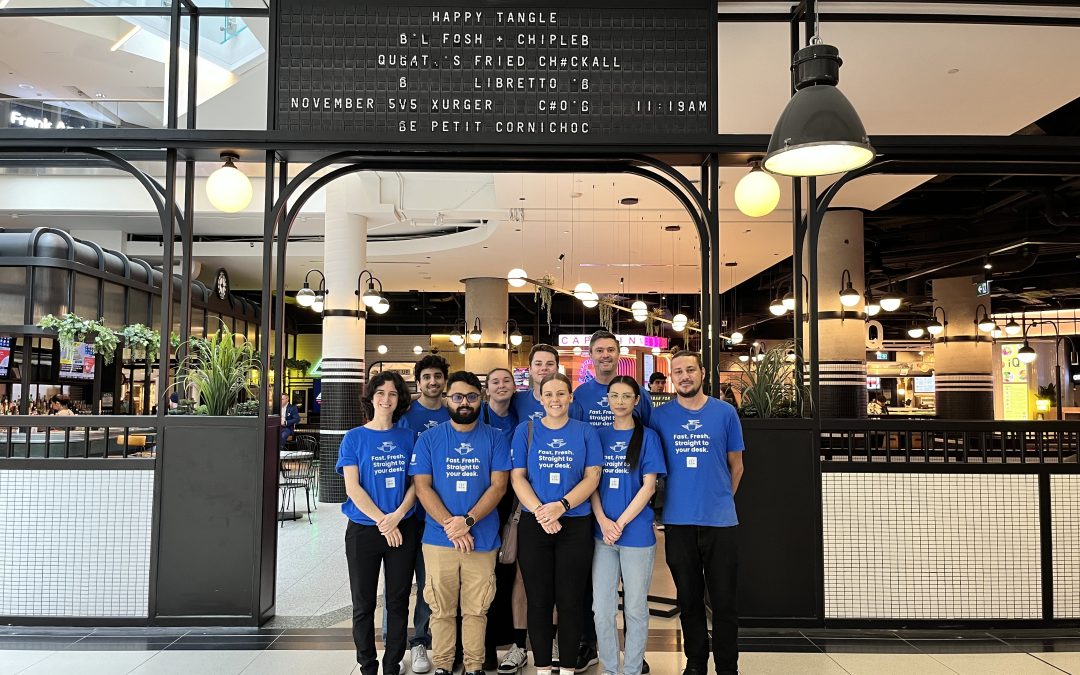It’s a bold move to name your food-delivery company after the show the Jetsons, known for its vision of flying cars, when your proposition involves couriers on foot. Founder Andrew Oliver can explain.

Andrew Oliver, founder of Jetson
“We liked how Rosey the Robot did things,” he said in an interview.
And it’s not as if Oliver is opposed to one day deploying robots for his start-up, which specializes in providing fast-walk deliveries to consumers within a handful of Toronto building complexes. It’s just he’s not sold on them yet.
“I wouldn’t be surprised if in 10 years there were food-delivery robots from commissary kitchens delivering in a fully autonomous way,” he said. “I can envision it going in that direction.”
But for now Jetson is focused on sending out human couriers in sneakers to hustle orders from vendors in One York Food Hall, Queen’s Cross Food Hall, which includes East Asian restaurant Happy Tangle, and CF Toronto Eaton Centre, to consumers in five office towers and two condo towers.
“It’s like the level of service that you would expect at a five-star hotel,” he said.
Jetson has been operational for a couple years. Not only are Jetson deliveries fast, they’re accurate. But when an error happens, Jetson can quickly make it right.
“If someone got a Coke instead of a Diet Coke, we can fix that immediately,” he said. “We can just run up another.”
This is far from Oliver’s first foray into the food world. He is also the president and CEO of Oliver & Bonacini, one of Canada’s leading restaurant and event groups.
The Jetson idea came to Oliver during a trip to Google’s New York headquarters in 2012.
“The space is ginormous. It’s four and a half million square feet in multiple towers in Chelsea Market, and it had something like 40 food-service operations taking place internally for its 12,000 employees,” he said. “I thought something like that could work up here.”
His many years in the restaurant business has afforded him empathy toward operators who might see a lot of sales using delivery marketplaces but not a lot of profit. Instead of lopping 30 percent off the top, Jetson charges operators a 10 percent user fee, plus a small delivery fee. “We want to make money for everyone in the ecosystem,” he said.
Oliver is keeping his delivery people busy. “In Toronto, Uber Eats drivers do one and a half deliveries an hour, while our guys can do 20 to 30 in an hour because they’re just going up and down elevators,” he said.
Oliver is eager to keep more delivery people busy through growth, but the variable he can’t control is whether employers in his client towers will return employees to the office. In 2024, roughly 53 percent of Canadians had returned to onsite work, according to a report by ADP Canada. That may or may not change going forward. But if RTO continues to grow, Jetson could be well-positioned to capitalize, especially since workplace food is becoming more prevalent.
Oliver is pleased with the results from his first two years.
“On the office side, 10 to 15 percent of the folks that do come in are using our app on a weekly basis, which is extremely high compared to any other kind of app that we’ve seen out there,” he said.
Oliver also detects opportunity in large orders, which is a trend he’s seeing in his other Oliver & Bonacini work.
“I also run a conventional catering business and our fastest-growing segment is off-premises orders and in-office catering,” he said. “At Jetson, we let companies give credits to their employees to order whatever they want, or the companies can order 40 or 50 or 100 meals at a time. We offer an advantage in that in cities like Toronto, traffic makes it difficult for anything to be delivered in a reasonable amount of time. We’re last-mile delivery. The food comes fast.”
So fast that a complaint Oliver occasionally hears is that the food arrives too hot. “That’s our number one complaint,” he said. “But that’s a good problem to have.”
Next up for Jetson is providing delivery in Scotia Plaza, a prominent skyscraper and commercial complex in Toronto’s financial district. This work will begin in the fall.
“The landlord, KingSett Capital, is building out the spaces and the amenities. So we’ll have the commissary kitchen on the top floor of the 68-story building, which also includes a conference center. You’ll be able to book the rooms, and you’ll also be able to book the catering for the rooms. We’ll be able to do in-office and catering for the three buildings,” he said. “This is 400 feet from where we’re currently operating. So the idea is if you have these nodes and hubs, where you can access 50,000 to 100,000 people within a mile, you can get those delivery times where we are consistently sub-20 minutes, even if you’re mixing and matching orders, like barbecue and sushi. We’re not aware of other apps that can do anything even remotely close to that.”
And after getting set up in Scotia Plaza, the rest of the continent beckons.
“We plan on expanding, in Canada, and in the U.S.,” he said. “We’re just looking for the right partners.”


